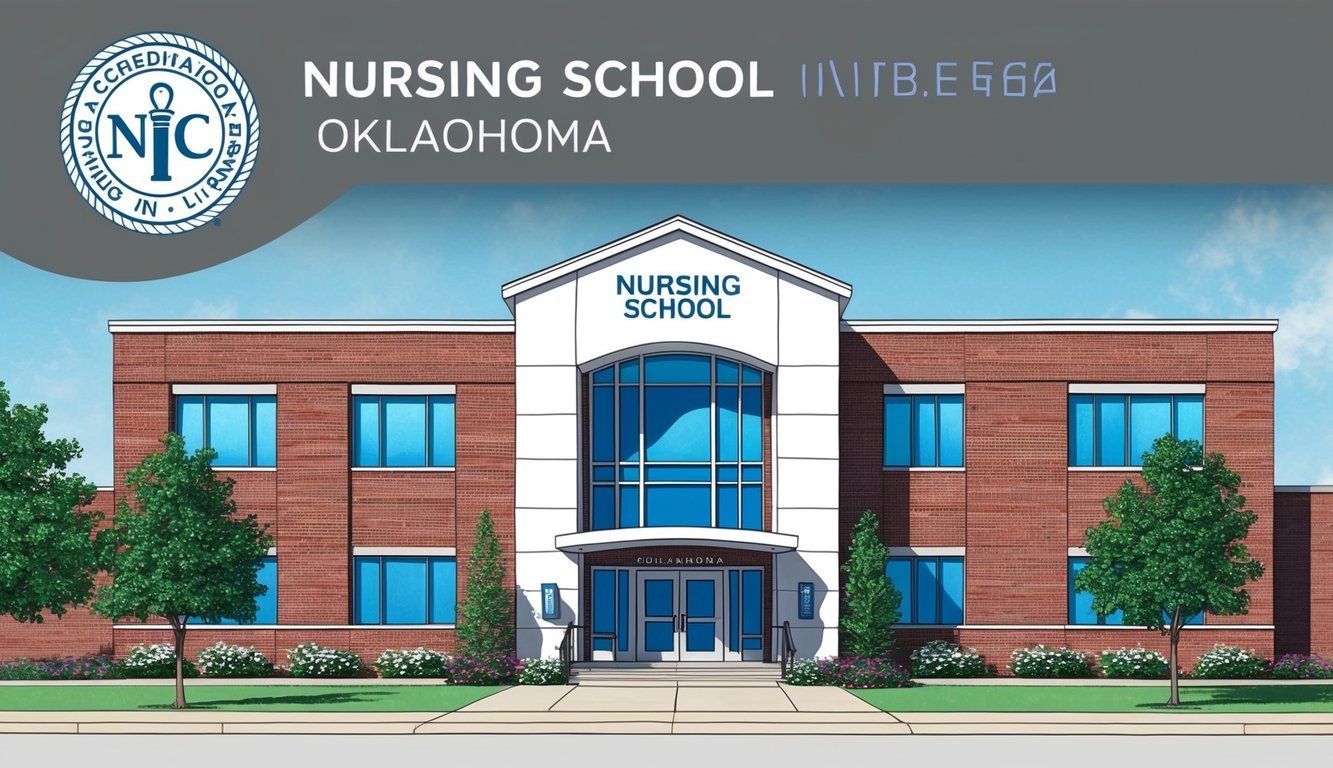Nursing is a rewarding career that allows you to make a difference in people’s lives.
In Oklahoma, many reputable nursing schools prepare you for this vital profession.
Whether you’re seeking an Associate Degree in Nursing (ADN) or a Bachelor of Science in Nursing (BSN), the options are plentiful.
These institutions blend classroom learning with hands-on clinical experience, ensuring you acquire the necessary skills.
As you explore nursing schools in Oklahoma, it’s important to consider accreditation and licensing requirements.
The job market for nurses in Oklahoma is projected to grow significantly in the coming years, making it a great time to enter the field.
With a variety of programs available, finding the right fit for your educational and professional goals is essential.
Your path to becoming a nurse can be as diverse as the healthcare settings you will work in.
Take the time to research the programs that align with your aspirations, and get ready to embark on a fulfilling journey in nursing.
Key Takeaways
- Oklahoma offers a wide range of nursing programs to fit your goals.
- Accreditation is crucial for obtaining your nursing license.
- The job market for nurses in Oklahoma is expected to grow significantly.
Exploring Nursing Degree Options

In Oklahoma, you have various pathways to pursue a nursing career.
Each degree type has unique benefits and can affect your career options and salary potential.
Understanding these pathways is essential for making an informed choice.
Associate Degree in Nursing (ADN) Programs
The Associate Degree in Nursing (ADN) program typically takes about two years to complete.
This program prepares you for entry-level nursing positions in hospitals, clinics, and other healthcare settings.
Most ADN programs focus on both theoretical knowledge and clinical practice.
You will engage in coursework that includes anatomy, pharmacology, and nursing fundamentals.
Additionally, you’ll complete hands-on clinical training to develop your skills.
Oklahoma offers several schools with ADN programs.
Upon graduation, you’ll be eligible to take the NCLEX-RN exam to become a Registered Nurse (RN).
Bachelor of Science in Nursing (BSN) Overview
The Bachelor of Science in Nursing (BSN) program usually lasts four years and provides a more comprehensive education.
With a BSN, you can access a wider range of nursing roles, including leadership and administrative positions.
BSN programs include courses in public health, nursing research, and management.
Many schools, such as Oklahoma City University’s Kramer School of Nursing, offer flexible options, including an Accelerated BSN Program for those who already hold a degree.
Earning a BSN can enhance your job prospects and may lead to higher earning potential.
Many employers now prefer or require a BSN for certain positions.
Master of Science in Nursing (MSN) Pathways
The Master of Science in Nursing (MSN) is designed for RNs looking to specialize further or move into advanced practice roles.
This program generally takes between one to three years, depending on your prior education.
Common MSN specializations include Nurse Practitioner, Clinical Nurse Specialist, and Nurse Educator.
These programs often combine advanced clinical practice with leadership and management training.
Oklahoma offers MSN pathways at several nursing schools.
Completing an MSN program prepares you for advanced roles in healthcare, providing greater job opportunities and potential for higher salaries.
If you are considering advancing your nursing career, an MSN can be a valuable step.
Accreditation and Licensing

Accreditation and licensing are crucial for nursing schools in Oklahoma.
Understanding these aspects ensures that you receive a quality education and can practice as a registered nurse (RN) in the state.
Understanding the Oklahoma Board of Nursing’s Role
The Oklahoma Board of Nursing (OBN) plays a vital role in regulating nursing education and practice.
The OBN ensures that nursing programs meet specific standards, protecting the public and maintaining the credibility of the profession.
When exploring nursing schools, check if they are approved by the OBN.
This approval means the program meets the necessary educational criteria.
You can verify a school’s approval status on the Oklahoma Board of Nursing website.
The Importance of Accreditation in Nursing Programs
Accreditation is critical when selecting a nursing program.
Accredited programs meet high educational standards and help you qualify for federal financial aid.
Schools can be accredited by national organizations like the Commission on Collegiate Nursing Education (CCNE) or the Accreditation Commission for Education in Nursing (ACEN).
Here are some benefits of attending an accredited program:
- Better job prospects: Employers often prefer graduates from accredited schools.
- Higher NCLEX-RN pass rates: Accredited programs typically have better outcomes on the licensing exam.
- Easier transfer credits: If you decide to continue your education, accredited programs often have agreements with other schools.
Navigating the RN License Process
After completing an accredited nursing program, you must obtain your RN license to practice in Oklahoma.
The process starts with applying to take the NCLEX-RN exam.
Here’s a simple list of steps to follow:
- Apply to the OBN: Submit your application for licensure by examination.
- Register for the NCLEX-RN: After approval, you will receive an authorization to test, allowing you to schedule your exam.
- Prepare for the NCLEX-RN: Study and utilize resources to ensure a strong chance of passing.
- Pass the exam: A passing score is required for licensure.
You can find more information on the licensing process and NCLEX-RN pass rates on the Oklahoma Board of Nursing website.
Following these steps will set you on the path toward a successful nursing career.
Top Nursing Schools and Programs in Oklahoma
Oklahoma offers a variety of nursing programs across several well-respected schools.
These institutions provide a range of degrees, including Associate Degree in Nursing (ADN) and Bachelor of Science in Nursing (BSN).
Below are key insights into the top nursing schools and their unique offerings.
Comparing Nursing School Rankings
When choosing a nursing school, rankings can provide valuable insight.
Here’s a quick comparison of some of the top nursing schools in Oklahoma based on their programs and student outcomes:
| Nursing School | Programs Offered | Ranking | Location |
|---|---|---|---|
| University of Oklahoma Health Sciences Center | BSN, MSN, DNP | 1 | Oklahoma City |
| Oklahoma City University, Kramer School of Nursing | BSN, Accelerated BSN, RN-to-BSN | 2 | Oklahoma City |
| Oklahoma Baptist University | BSN, RN-to-BSN | 3 | Shawnee |
| Northwestern Oklahoma State University | BSN, ADN | 4 | Alva |
These rankings often reflect factors such as graduation rates, faculty credentials, and job placement success.
Spotlight on Oklahoma City University’s Kramer School of Nursing
The Kramer School of Nursing at Oklahoma City University is known for its diverse programs.
It offers traditional BSN, accelerated BSN, and RN-to-BSN pathways.
These options allow students to select the program that best fits their career goals and schedules.
The school emphasizes hands-on training through clinical placements.
Students gain real-world experience in various healthcare settings, enhancing their skills in patient care.
The faculty at Kramer are experienced practitioners committed to student success.
For more information about their programs, visit Kramer School of Nursing.
An Overview of Northwestern Oklahoma State University’s Nursing Offerings
Northwestern Oklahoma State University provides a comprehensive nursing program that includes both BSN and ADN tracks.
The BSN program focuses on preparing nursing students for advanced practice roles.
The ADN program is designed for those looking to enter the nursing field more quickly.
One unique aspect of their program is the emphasis on community health and outreach.
Students engage in initiatives that serve local populations, giving them practical experience.
For more details, check out the programs offered at Northwestern Oklahoma State University.
Clinical Experience in Nursing Education

Gaining practical experience is essential for nursing students.
Clinical education typically includes clinical rotations, simulation labs, and exposure to diverse clinical settings, all of which prepare you for real-world patient care.
The Significance of Clinical Rotations
Clinical rotations are a key part of nursing education.
During these rotations, you work directly with patients under the supervision of experienced nurses and healthcare professionals.
You can expect to rotate through various departments, such as:
| Department | Focus Area |
|---|---|
| Medical-Surgical | General patient care |
| Pediatrics | Care for children |
| Geriatrics | Focus on older adults |
| Psychiatry | Mental health care |
This hands-on experience helps you develop vital skills, such as assessing patient needs, administering medications, and executing care plans.
Moreover, these rotations provide real-life contexts for classroom concepts.
Simulation Labs and Their Role in Nursing Training
Simulation labs are crucial for bridging the gap between theory and practice.
Facilities like the Meinders Simulation Center offer advanced technology that allows you to practice in a safe environment.
In the simulation lab, you can hone skills such as:
- Patient assessment
- Emergency response
- Communication techniques
These labs use high-fidelity mannequins that simulate real patient scenarios.
This method allows for repeated practice without putting actual patients at risk.
It enhances your confidence and competence before entering clinical settings.
Engaging with Diverse Clinical Settings
Exposure to diverse clinical settings is vital to your nursing education.
You will encounter patients from various backgrounds and with different health needs.
Common clinical settings include:
| Setting | Key Experiences |
|---|---|
| Hospitals | Acute care and emergency situations |
| Clinics | Routine check-ups and preventative care |
| Community Health | Public health initiatives and education |
Working in these environments helps you learn to adapt your care to meet individual patient needs.
Engaging with diverse populations also encourages cultural competence, improving your ability to serve different communities effectively.
Advancing in the Nursing Field

As you consider advancing your career in nursing, there are various paths and opportunities available.
You can explore specializations like Nurse Practitioners and Nurse Anesthetists, as well as options for continuing education and research.
Emphasizing the core value of caring will also enhance your nursing practice.
Specializations: Nurse Practitioner and Nurse Anesthetist Paths
Becoming a Nurse Practitioner (NP) allows you to diagnose and treat patients, gaining greater responsibility in patient care.
NPs can specialize in areas such as pediatrics, geriatrics, or family medicine, depending on your interests.
This role typically requires a Master’s degree in nursing and additional certifications.
Alternatively, pursuing the path of a Nurse Anesthetist (CRNA) is another highly regarded specialty.
CRNAs administer anesthesia and monitor patients during surgery.
This path demands advanced education and significant clinical experience.
Both specializations offer significant fulfillment and advanced career opportunities.
Continuing Education and Research Opportunities for Nurses
Continuing education is vital in nursing.
It helps you stay updated with the latest practices and technologies.
Many hospitals offer workshops and seminars.
You may also consider pursuing additional certifications or a Doctor of Nursing Practice (DNP) degree.
Research plays an important role in advancing nursing practice.
Participating in research projects can enhance your skills and knowledge.
Many universities and healthcare facilities seek nurses to assist with research studies.
Engaging in research helps improve patient care and outcomes.
Embracing the Core Value of Caring in Nursing Practice
Caring is at the heart of nursing.
It is essential to foster strong relationships with your patients.
Your ability to display empathy, compassion, and understanding influences their experience significantly.
Incorporating this core value into your practice enriches patient interactions and encourages trust.
Consider engagement in community service or outreach programs as a way to deepen your commitment.
These experiences will not only benefit your professional growth but also enhance your ability to make a difference in people’s lives.
Frequently Asked Questions

You may have numerous questions about nursing schools in Oklahoma.
This section addresses key topics such as accredited programs, requirements for specific universities, program durations, fast-track options, the number of schools available, and online degree opportunities.
What are the top accredited nursing schools in Oklahoma?
Some of the top accredited nursing schools in Oklahoma include:
| School Name | Location |
|---|---|
| University of Oklahoma Health Sciences Center | Oklahoma City |
| Oklahoma City Community College | Oklahoma City |
| Rose State College | Midwest City |
| Northeastern State University | Tahlequah |
| University of Central Oklahoma | Edmond |
These schools offer a variety of nursing programs to meet your educational needs.
What are the requirements for the University of Oklahoma Nursing program?
To apply for the University of Oklahoma Nursing program, you need to meet several requirements:
- Complete prerequisite courses.
- Maintain a minimum GPA (often around 3.0).
- Submit a completed application.
- Provide two letters of recommendation.
Make sure to check the university’s website for the most updated details.
How long is the duration to become a Registered Nurse (RN) in Oklahoma?
Typically, it takes about two to four years to become a Registered Nurse in Oklahoma.
- Associate Degree in Nursing (ADN): 2 years.
- Bachelor of Science in Nursing (BSN): 4 years.
You can choose the path that best fits your career goals.
Which colleges offer fast-track nursing programs in Oklahoma?
Fast-track nursing programs are available in several colleges in Oklahoma.
Some options include:
- University of Oklahoma Health Sciences Center
- Oklahoma City Community College
These programs are designed to help you complete your nursing education in a shorter time frame.
How many nursing schools are available in Oklahoma?
Oklahoma has around 30 nursing programs across various institutions.
This includes community colleges, universities, and vocational schools.
These schools offer diverse options for aspiring nurses.
What options are available for online nursing degrees in Oklahoma?
Several nursing schools in Oklahoma offer online degree options.
Some programs include:
- Bachelor of Science in Nursing (BSN)
- RN to BSN programs
You can explore institutions such as the University of Central Oklahoma or Oklahoma State University for online nursing degrees that suit your needs.

